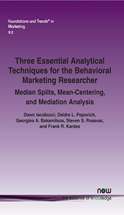Three Essential Analytical Techniques for the Behavioral Marketing Researcher: Median Splits, Mean-Centering, and Mediation Analysis
By Dawn Iacobucci, Owen Graduate School of Management Vanderbilt University, USA, dawn.iacobucci@owen.vanderbilt.edu | Deidre L. Popovich, Rawls College of Business Texas Tech University, USA, Deidre.Popovich@ttu.edu | Georgios A. Bakamitsos, Stetson University, USA, bakamitsos@stetson.edu | Steven S. Posavac, Owen Graduate School of Management Vanderbilt University, USA, steve.posavac@owen.vanderbilt.edu | Frank R. Kardes, Lindner College of Business University of Cincinnati, USA, kardesfr@ucmail.uc.edu
Abstract
For the behavioral marketing scholar, experimentation and the analysis of variance are among the most important and frequently relied upon tools of the trade, and many useful texts exist to guide researchers on these topics. This monograph is intended to be a supplemental resource and a helpful guide for conducting three essential analytical techniques that are also frequently useful to the behavioral researcher: (1) we discuss the practice of conducting a median split on a continuous variable to facilitate communication clarity. (2) We demonstrate the practice of centering variables about their means prior to creating product terms to reflect interaction effects in a moderated multiple regression model. (3) We discuss the practice of a mediation analysis to test for the relative impact of direct and indirect effects of predictors on dependent variables.
Three Essential Analytical Techniques for the Behavioral Marketing Researcher: Median Splits, Mean-Centering, and Mediation Analysis
Three Essential Analytical Techniques for the Behavioral Marketing Researcher: Median Splits, Mean-Centering, and Mediation Analysis reviews several topics that are essential complementary analytics that enable behavioral marketing researchers to thoroughly test theories and hypotheses, and thereby advance their respective literatures and contribute to knowledge bases. The intended audience for this monograph is behaviorally oriented marketers interested in learning more about some core analytical tools of the trade. The authors proceed under the assumption that most consumer behavior researchers have a strong, clear foundation in the understanding and execution of experimentation and the analysis of variance (ANOVA).
After an introduction, Section 2 reviews the use of median splits – what they are and when it is it acceptable and completely appropriate and legitimate to use them. Section 3 examines the use of meancentering when conducting moderated multiple regressions. Section 4 discusses mediation analysis, first describing the basic approach and then covering advanced issues around fitting the model, including structural equations models, multi-item scales, and categorical variables. Section 5 reviews the earlier topics, and makes further recommendations.
